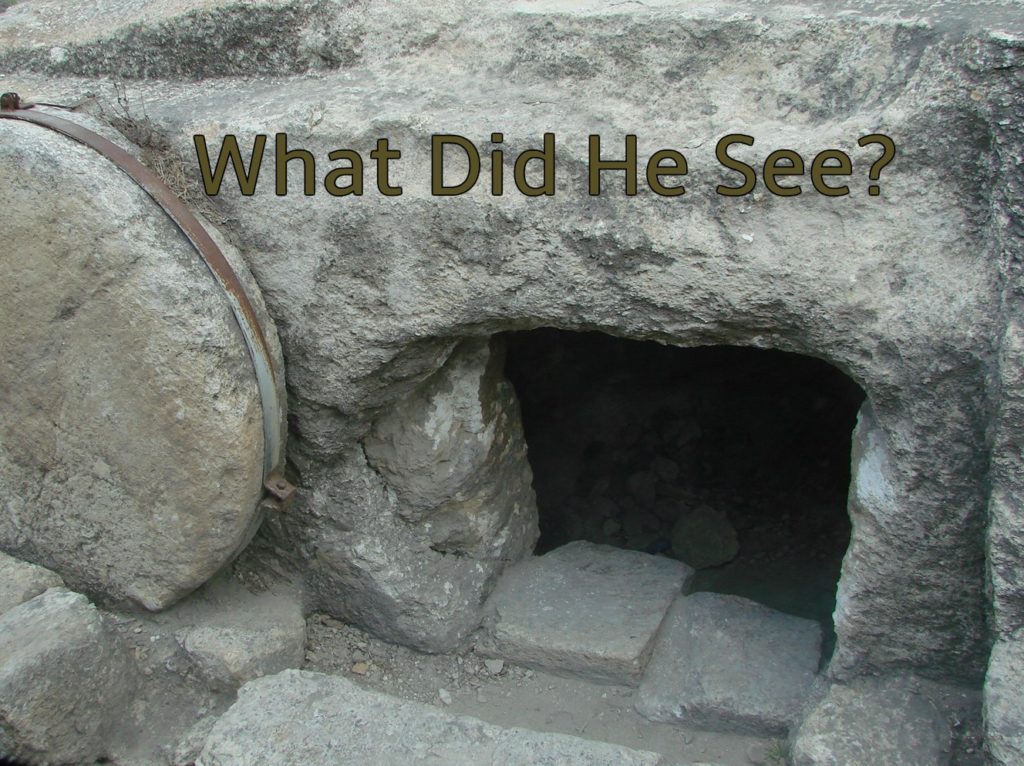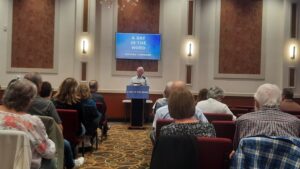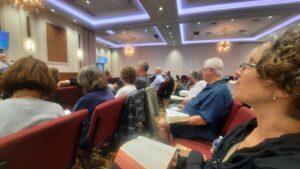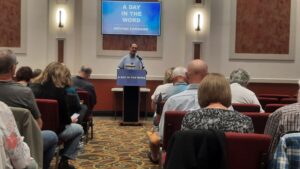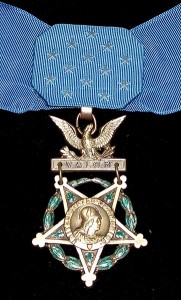There is a record in the book of Judges that many readers of the Bible have found difficult to understand. In 2010, I posted an article on this site entitled, Bewailing Virginity.
While having the great privilege of teaching God’s Word for nearly 50 years, I still consider myself a student of the Bible. There is only One Who completely understands every verse of the Bible, and that is the Author, God Himself. Therefore, we can all continue to learn.
The original article has received numerous comments. Having recently revisited this topic, I have come to have a little more understanding. It is my intention to pass on that understanding, which is why I entitled this article, Bewailing Virginity – Revised.
(At the end of this article, there is a link to a recent teaching I did in which I shared a good portion of the article below.)
For those wanting to read this revised version, please note this will not be a short article. But I hope by taking the time, you, as I have, will gain a greater appreciation of the record from Judges 11. At the end of this article you will find additional resources from others who have discussed this topic.
As you are aware, the Bible is an Eastern book, meaning it was not written from the perspective of our modern Western culture. It is very important when reading the Bible to take into consideration the culture in which it was written. That would of course include manners, customs, idioms, lifestyles, etc.
There is no one I am aware of who had, or has, a greater understanding of Bible culture than the late Bishop K.C. Pillai. Much of the material in the first article, as well as the content in my book, What Does it Mean?, came as a result of what I learned from him. That is why in my book, in the Preface, I included a serious explanation to the reader of why he is such a great authority.
Before I share some added insight I’ve learned about Judges 11, for those WHO may not have my book, I’m including, from the Preface, a portion of what I wrote about Bishop K.C. Pillai.
“I was first introduced to eastern customs in the Bible during a biblical class in 1975. A portion of the class was devoted to keys of how to get a proper interpretation of the Scriptures from the Scriptures themselves. One of the keys discussed was orientalisms.
“I live in the western world. The people of biblical times lived in the eastern world, or what we refer to today as the Middle East. Thus, the Bible is indeed an eastern book.
“Over the years I have thrilled at the added understanding of many verses once I understood the culture of the Bible. I have studied many resources concerning this topic and taken numerous biblical classes and lectures where various orientalisms were shared.
“By far, the greatest resource for me has been the teachings of Bishop K.C. Pillai. In the late 1970’s, I enjoyed reading three of his books. Later, I had access to many, many more of his teachings, both printed and audio recordings. While I am deeply grateful for all the biblical classes and teachers I’ve learned from for over forty years, in my opinion, Bishop Pillai is the foremost authority on this topic, period. Let me explain why.
“Bishop Pillai was born in 1900 in India and raised Hindu. When he converted to Christianity, his family disowned him, literally holding a funeral service and burying his picture in a casket. Nevertheless, he was ordained a bishop in the Eastern Orthodox Church in India. Later, he would be sent on a special mission.
“At the time of the Bishop’s early life, his native India had remained an isolated country for thousands of years. Therefore, the customs and manners of the people were still aligned with the eastern, biblical culture. Much of the rich eastern culture and tradition Bishop Pillai was reared and educated in has changed dramatically. The twentieth century saw great changes around the world, which eventually included India. Bishop Pillai’s knowledge of eastern culture brought great understanding of the Scriptures to the western world.
“Sir S. Radhakrishnam wrote, “Any interpretation of the Jewish religion which ignores the total environment in which it grew up would be dangerously narrow.”[i] Add to that the words of Max Muller, “Whatever sphere of the human mind you may select for your special study, whether it be language, or religion, or mythology, or philosophy, whether it be the laws or customs, primitive art or primitive science, everywhere, you have to go to India, whether you like it or not because some of the most valuable and most instructive material in the history of man are treasured in India, and in India only.”[ii]
“Bishop Pillai once wrote, “The Oriental traditions and philosophy are foreign to the Occidental world in general. Therefore, it is essential that one understand the Oriental thought and way of life (especially that of India, since the culture of India was adopted by the Middle East and Near East centuries before the birth of Christ). Otherwise, one will be unable to understand the Spiritual significance of the Scripture. We cannot believe what we do not understand.”[iii]
“Recognizing the lack of understanding in the western world, the Indian Orthodox Church sent Bishop Pillai on a mission: to bring the light of the Scriptures through understanding the culture in which it was written. Bishop Pillai spent the last twenty years of his life acquainting Christians with the orientalisms of the Bible, imparting great enlightenment of the eastern culture. His mission carried him to numerous universities and seminaries as well as every major denomination throughout Europe, England, the United States, and Canada.
“In, What Does it Mean? the reader will gain an understanding of many verses as well as some practical application for consideration. An understanding of what a word or phrase means can be very enlightening and inspiring. However, the practical application presented will also be of great benefit to the reader.
“This book is not a re-presentation of Bishop Pillai’s writings or teachings. Rather, it is a culmination of my study and understanding of the Scriptures.”
[i] Sarvepalli Radhakrishnan, Eastern Religions and Western Thought (Oxford University Press 2007), 23
[ii] Max F. Muller, What Can It Teach Us (Book Tree 1999), 37
[iii] Bishop K.C. Pillai, Orientalisms of the Bible (Mor-Mac Publishing Company, Inc. 1969), xii
Bewailing Virginity – Revised
(On Sunday, 9/29/2024, at our Sunday morning Westbrook Village Fellowship, I shared a good portion of this article, as well as some other insights. Here is the link to that teaching: Bewailing Virginity.).
Let’s consider the record in chapter 11, in the book of Judges.
It is very important to note that the main character we are looking at, Jephthah, is also one of those who is listed in the book of Hebrews, Chapter 11. Bible students are well aware that chapter lists many of the great believers of the Old Testament, including Abel, Noah, Abraham, Moses, and many more. Some have referred to that chapter as, “The Hall of Fame of Believers.” Therefore, we know God had a very high opinion of this man, or else God would not have had him included among so many of the great believers of the Old Testament. This is very important to keep in mind when reading the record in Judges 11.
Judges 11:29 -40:
Then the Spirit of the LORD came upon Jephthah, and he passed over Gilead, and Manasseh, and passed over Mizpeh of Gilead, and from Mizpeh of Gilead he passed over unto the children of Ammon.
:30 And Jephthah vowed a vow unto the LORD, and said, If thou shalt without fail deliver the children of Ammon into mine hands,
:31 Then it shall be, that whatsoever cometh forth of the doors of my house to meet me, when I return in peace from the children of Ammon, shall surely be the LORD’S, and I will offer it up for a burnt offering.
:32 So Jephthah passed over unto the children of Ammon to fight against them; and the LORD delivered them into his hands.
:33 And he smote them from Aroer, even till thou come to Minnith, even twenty cities, and unto the plain of the vineyards, with a very great slaughter. Thus the children of Ammon were subdued before the children of Israel.
:34 And Jephthah came to Mizpeh unto his house, and, behold, his daughter came out to meet him with timbrels and with dances: and she was his only child; beside her he had neither son nor daughter.
:35 And it came to pass, when he saw her, that he rent his clothes, and said, Alas, my daughter! thou hast brought me very low, and thou art one of them that trouble me: for I have opened my mouth unto the LORD, and I cannot go back.
:36 And she said unto him, My father, if thou hast opened thy mouth unto the LORD, do to me according to that which hath proceeded out of thy mouth; forasmuch as the LORD hath taken vengeance for thee of thine enemies, even of the children of Ammon.
:37 And she said unto her father, Let this thing be done for me: let me alone two months, that I may go up and down upon the mountains, and bewail my virginity, I and my fellows.
:38 And he said, Go. And he sent her away for two months: and she went with her companions, and bewailed her virginity upon the mountains.
:39 And it came to pass at the end of two months, that she returned unto her father, who did with her according to his vow which he had vowed: and she knew no man. And it was a custom in Israel,
:40 That the daughters of Israel went yearly to lament the daughter of Jephthah the Gileadite four days in a year.
Did Jephthah actually offer his daughter as a literal burnt offering to the Lord, meaning have her killed? Verse 29 is often overlooked; it says …”the Spirit of the Lord came upon Jephthah.” To serious Bible students, that speaks volumes. Jephthah having the spirit of the Lord walked with and for God. And keeping in mind that God recognized and listed Jephthah with the great believers of the Old Testament, Jephthah would have never considered a human sacrifice. The Old Testament law absolutely forbade that.
Deuteronomy 12:30-31:
Take heed to thyself that thou be not snared by following them, after that they be destroyed from before thee; and that thou enquire not after their gods, saying, How did these nations serve their gods? even so will I do likewise.
Thou shalt not do so unto the LORD thy God: for every abomination to the LORD, which he hateth, have they done unto their gods; for even their sons and their daughters they have burnt in the fire to their gods.
Knowing that Jephthah had the spirit of the Lord upon him, and that God included him with the list of great believers in Hebrews 11, it is troubling to think that he would have disobeyed such a very specific commandment of the Lord, or even considered it! Are we to think that Jephthah in asking God for His help, vowed that if he was successful he would do something that was absolutely forbidden by God? And yet, verse 40 said that Jephthah “…did with her according to his vow which he had vowed.”
A careful look at verses 38-40 indicate that he did not offer his daughter as a human sacrifice.
From E.W. Bullinger
The great Bible researcher, E.W. Bullinger, has some very interesting and noteworthy insight into this passage of scripture in his Bible, The Bullinger Bible. He also included a chapter on this passage in his book, Great Cloud of Witnesses. That entire chapter is included later in this post.
Verse 31, tells us the vow Jephthah made: “…Then it shall be, that whatsoever cometh forth of the doors of my house to meet me, when I return in peace from the children of Ammon, shall surely be the LORD’S, and I will offer it up for a burnt offering.”
Bullinger points out that the word, “and” (put above in bold type) can also be translated as, “or.” That would mean the verse would be rendered, “…whatsoever cometh forth of the doors of my house to meet me, when I return in peace from the children of Ammon, shall surely be the LORD’S, or, I will offer it up for a burnt offering.” Bullinger concludes that Jephthah’s intention was either a burnt offering, which would have to be an animal sacrifice, or, it would be in giving someone to the Lord.
From the chapter in his book, mentioned above, Bullinger wrote the following:
“It is recorded that Jephthah “did with her according to his vow
which he had vowed, and she knew no man” (v. 39). What has this to do
with a burnt offering, one way or the other? But it has everything to do
with the former part of his vow, in dedicating her to Jehovah. This
seems to be conclusive. It has nothing to do with a sacrificial death, but
it has to do with a dedicated life. She was dedicated to a perpetual
virginity.
“To what else can the “custom of Israel” refer (v. 39, 40) when “the
daughters of Israel went yearly to lament the daughter of Jephthah the
Gileadite, four day in a year” (v.40).”
At this point, I would like to add that some have wondered how Jephthah could have spoken such a vow, having only one daughter. People assume the only people in his house were his wife and daughter. but no one really knows how many people were in his household. Furthermore, when we read “house” we think of the houses we live in today, but we don’t know what his house looked like; we don’t know the layout of his property. And, interestingly, the word translated “doors” in verse 31 can also be translated “gates.”
From Bishop K.C. Pillai
Here is some insight on this record, including, “bewailing virginity, from the teachings of Bishop K.C Pillai.
“Now this does not mean that the person will be killed and burned on the altar, as many have thought. God has never required that mankind bring human sacrifices. A person who is dedicated to the Lord is sent to serve in the temple and they will never marry. It is like the nuns and priests which we see in the Roman Catholic Church today. The basis for this is found in Leviticus.”
Leviticus 27:2:
Speak unto the children of Israel, and say unto them, When a man shall make a singular vow, the persons shall be for the LORD by thy estimation.
“When Jephthah saw his daughter, he rent his mantle because of the promise he had made to God concerning the burnt sacrifice. He had no other children and felt sorrow. The girl understood immediately.”
Judges 11:36-38:
And she said unto him, My father, if thou hast opened thy mouth unto the LORD, do to me according to that which hath proceeded out of thy mouth; forasmuch as the LORD hath taken vengeance for thee of thine enemies, even of the children of Ammon.
And she said unto her father, Let this thing be done for me: let me alone two months, that I may go up and down upon the mountains, and bewail my virginity, I and my fellows.
And he said, Go. And he sent her away for two months: and she went with her companions, and bewailed her virginity upon the mountains.
“This does not mean she would be killed because human sacrifice has always been forbidden. Jephthah gave her as a living sacrifice to serve God for the rest of her life. He gave her to the temple to serve there. This is a burnt offering—suffering humiliation, disgrace, insult to serve in the temple for life.
“Jephthah was not going to kill his daughter and offer a burnt sacrifice. Once having served in the temple, the servant lived and died there, and never left. The father followed through with his pledge to God. The daughter wanted to see her father keep his promise, so she was willing to sacrifice all else. Jephthah could not go back on his vow to God, because the vow to God was salted. If something is said to God, it cannot be broken. The daughter was brought up to be obedient and treated her parents as unto God.
“Any virgin who knew no man and was not married, when she decided to go to the temple and serve the Lord, she has to go for two months to the mountains with her girlfriends to bewail her virginity. In the mountains they have prayer meetings, consecration meetings, seeing and visiting relatives and friends, saying her “goodbyes” to the pleasures and things of the world, etc.
“This was a common occurrence when women were preparing to enter the service of the temple. They receive all their friends and relatives, and bewail the loss of their worldly life. Jephthah’s daughter was a princess; she would have had fine clothes and jewels and servants; she would have married and given Jephthah the joy of grandchildren and heirs. All this was now out of the question, since Jephthah had made the vow.”
Judges 11:39, 40:
And it came to pass at the end of two months, that she returned unto her father, who did with her according to his vow which he had vowed: and she knew no man. And it was a custom in Israel,
That the daughters of Israel went yearly to lament the daughter of Jephthah the Gileadite four days in a year.
“When the virgin is brought to the door of the temple at the end of the two months, she is prepared to enter the service of the temple. Her hair is shaved off to signify that she is laying aside the glory of her head so that she may serve God. Her fashionable clothes are exchanged for the white robe which is the symbol of purity and sanctity.
“And so it was with Jephthah’s daughter. As a princess in this case, she took off all of her clothes and jewelry putting on a long white robe which covered her head and began to serve God from there on.
“This word “lament” is a misplaced word. Some of you may have Bibles with a marginal note saying that this word should be “talk with.” It seems strange to me that the truth is in the margin and the lie is left in the text. When the women go to visit her in the temple, they would say, “How wonderful you are, we wish we were like you! You don’t have the sins or pleasures of the world to bother you. You, by choice, are separated from the things of this world. God must be loving and honoring you for the sacrifice you have made and the humiliation you go through. Thereby, they comfort her by praising her.”
Conclusion
In conclusion, Bullinger, as well as many Bible scholars, agree with Bishop Pillai regarding the word, “lament.” They agree that the word “lament” does not mean to mourn, but rather it has the meaning of conversation, and more specifically, honor and praise..
As a final note, it would appear Bishop Pillai was not aware of the insight that Bullinger presents in his Bible regarding the word, “and” in verse 31. I wasn’t until recently. But both Bullinger and Pillai agree, as I do, and as many other Bible students do, that Jephthah did not offer his daughter up as a human sacrifice.
I hope this expanded revised article adds insight and learning from this passage in Judges 11.
On 9/29/2024, at our Sunday morning fellowship, I shared a good portion from this article. It is posted under the tab, Recent Teachings. You can also access it here.)
Mike Verdicchio
2024
Other Resources
(My thanks to my good friend, Dave Bailey for providing the following resources, including the complete article by Dr. E. W. Bullinger).
1) Gleason L. Archer, New International Encyclopedia of Bible Difficulties, Based
on the NIV and the NASB, Electronic edition (Zondervan, 2001) 240
2) Alfred Edersheim, Bible History Old Testament, Electronic edition (Hendrickson
Publishers Marketing,LLC,1995, originally published 1890, 11 th printing 2018)
420
3) New King James Version Study Bible, Second Edition (Thomas Nelson, 2007),
391
4) Adam Clarke, Commentary on the Bible, by Adam Clarke [1831].
(Text Courtesy of Internet Sacred Texts Archive).
5) Did Jephthah really sacrifice his daughter ? An analysis of Judges 11:31, by E.W. Bullinger
Note: Below is a chapter from the book of E. W. Bullinger : Great Cloud of Witnesses in Hebrews 11, Kregel Publications, 1979, pp. 324-331. This book as well as all other work of E. W. Bullinger is in the
public domain (i.e. free from copyright).
Jephthah is introduced to us under the same title as Gideon, «a
mighty man of valour» (Judges 11:1) Again, we have not to consider
his history as a man, but his faith,
which was of God.
He was one who feared Jehovah. In his earliest words he calls
Jehovah to witness; and he afterwards went and “uttered all his words
before Jehovah, in Mizpeh” (v. 11)
His message to the king of Ammon (vv. 14-27) shows that he was
well versed in the history of His people, as recorded in “the book of the
Law”. He must have studied it closely and to some purpose ; for he not
only knew the historical events as facts, but he recognised them as being
ordered by Jehovah.
He traced all to Jehovah. It was He Who had “delivered Sihon and
all his people into the hand of Israel” (v.21). It was Jehovah, God of
Israel, who had disposed the Amorites before His people (v.23). What
Jephthah and Israel would now posses was what God had given to them
(v. 24). And it was Jehovah, the Judge, Whom he called on to judge
between Israel and Ammon (v. 27).
Jephthah had heard the words of Jehovah as written down in the
Scriptures of truth; and he believed them. This is exactly an instance of
what the Apostle refers to in Hebrews xi. He, too, knew the history which
Jephthah believed, and the faith which conquered through God. This it is
that gives Jephthah his place in this great “cloud of witnesses.”
When he had thus called on God to judge, we read: “Then the
Spirit of the LORD came upon Jephthah,” and we again note the words
which this describe the action of the Holy Spirit in that dispensation
(v.29).
In the power of that Holy spirit, Jephthah undertook the war with
Ammon, and Jehovah crowned his faith by delivering the Ammonites
into his hand (v.32).
This is the exceedingly simple account of Jephthah’s overcoming
faith; and there is little to be added to it. He had simply read what
Jehovah had done; and thus heard what He had said. He believed what
he had thus read and heard, and this is quite sufficient to cause him to
be placed among the “elders who received a good report” on account of
their faith.
But in the case of Jephthah, as in no other, we feel compelled to
go out of our way to vindicate him from what we shall show to be the
unjust judgement of men.
His God-wrought faith must not be tarnished without the sure
and certain warrant of the word of God itself. Like Moses, Jephthah
“spake unadvisedly with his lips,” but this does not touch his faith in
what he had heard from God; his vow was made according to his zeal,
but not according to knowledge.
That he would sacrifice his daughter, and that God would not reprobate by one
word of disapproval a human sacrifice is a theory incredible. It is only a
human interpretation, on which Theologians have differed in all ages,
and which has been reached without a careful examination of the text.
It is important to remember that the ancient Jewish Commentator
Rabbi David Kimchi (1160-1232) renders the words of the
vow (Judges 11:31) very differently from the A.V (editor’s note: A.V. =
Authorised version, KJV) and R.V. (editor’s note: R.V. = Revised version),
and he tells us that his father Rabbi Joseph Kimchi (died 1180)
held the same view. Both father and son, together with Rabi Levi ben
Gerson (born 1288), all of them among the most eminent of Hebrew
grammarians and commentators, who ought to know better than any
Gentile commentator, gave their unqualified approval to the rendering
of the words of the vow which, instead of making it relate to one object,
translate and interpret it as consisting of two distinct parts.
This is done by observing the well known rule that the connective
particle ו) vau, our English v) is often used as a disjunctive, and mean
“or”, when there is a second proposition. Indeed this rendering is
suggested in the margin of the A.V. The following passages may be consulted:
Genesis 41:44
“Pharaoh said unto Joseph, I am Pharaoh, and without thee shall no
man lift up his hand OR foot in all the land of Egypt.”
Exodus 20:4
“Thou shalt not make unto thee any graven image, OR any likeness of
any thing that is in heaven above, OR that is in the earth beneath, OR
that is in the water under the earth”
Exodus 21:15
“He that smiteth his father, OR his mother, shall be surely put to
death.”
Exodus 21:17
“He that curseth his father, OR his mother, shall surely be put to death.”
Exodus 21:18
“if men strive together, and one smite another with a stone, OR with his
fist, and he die not, but keepeth his bed”
Numbers 16:14
“Moreover thou hast not brought us into a land that floweth with milk
and honey, OR given us inheritance of fields and vineyards: wilt thou
put out the eyes of these men? we will not come up.”
Numbers 22:26
“And the angel of the LORD went further, and stood in a narrow place,
where was no way to turn either to the right hand OR to the left.”
Deuteronomy 3:24
“what God is there in heaven OR in earth” &c.
2 Samuel 3:29
“Let it rest on the head of Joab, and on all his father’s house; and let
there not fail from the house of Joab one that hath an issue, OR that is a
leper, OR that leaneth on a staff, OR that falleth on the sword, OR that
lacketh bread.”
1 Kings 18:10
“there is no nation OR kingdom, whither my lord hath not sent to seek
thee.”
1 Kings 18:27
“And it came to pass at noon, that Elijah mocked them, and said, Cry
aloud: for he is a god; either he is talking, OR he is pursuing, OR he is
in a journey, or peradventure he sleepeth, and must be awaked.”
With a negative, the rendering “NOR” is equally correct and
conclusive:
Exodus 20:17
“Thou shalt not covet thy neighbour’s house, thou shalt not covet thy
neighbour’s wife, NOR his manservant, NOR his maidservant, NOR
his ox, NOR his ass, NOR any thing that is thy neighbour’s.”
Deuteronomy 7:25
“The graven images of their gods shall ye burn with fire: thou shalt not
desire the silver OR gold that is on them, NOR take it unto thee, lest
thou be snared therein: for it is an abomination to the LORD thy God.”
2 Samuel 1:21
“neither let there be rain, upon you, NOR fields of offerings”
Psalms 26:9
“Gather not my soul with sinners, NOR my life with bloody men:”
Proverbs 6:4
“Give not sleep to thine eyes, NOR slumber to thine eyelids.”
Proverbs 30:3
“I neither learned wisdom, NOR have the knowledge of the holy.”
We are now in a position to read and understand the word of
Jephthah’s vow, where we have the same word, or rather the letter
which represents it, in Hebrew.
“Jephthah vowed a vow (i.e., made a solemn vow) unto Jehovah,”
which he had a perfect right to do. Such a vow was provided for in the
Law which prescribed exactly what was to be done in such cases ; and
even when the vow affected a person (as it did here) that person could
be redeemed if it were so desired. See Lev. 27 where in verses 1-8 it
affected “persons,” and verses 9-13 it affects “beasts”; and verses 14-15 a
house.
It thus seems clear that Jephthah’s vow consisted of two parts;
one alternative to the other. He would either dedicate it to Jehovah
(according to Lev. 27), or, if unsuitable for this, he would offer it as a
burnt offering.
It should be noted also that, when he said “whatsoever cometh
forth of the doors of my house to meet me,” the word “whatsoever” is
Masculine. But the issuer from his house was Feminine, and therefore
could not come, properly, within the sphere of his vow certainly not
according to the literal meaning of his words.
In any case, it should have been unlawful, and repugnant to
Jehovah, to offer a human being to Him as a burnt-offering, for His
acceptance. Such offerings were common to heathen nations at that time, but
it is noteworthy that Israel stands out among them with this great
peculiarity, that human sacrifices were unknown in Israel.
It is recorded that Jephthah “did with her according to his vow
which he had vowed, and she knew no man” (v. 39). What has this to do
with a burnt offering, one way or the other? But it has everything to do
with the former part of his vow, in dedicating her to Jehovah. This
seems to be conclusive. It has nothing to do with a sacrificial death, but
it has to do with a dedicated life. She was dedicated to a perpetual
virginity.
To what else can the “custom of Israel” refer (v. 39, 40) when “the
daughters of Israel went yearly to lament the daughter of Jephthah the
Gileadite, four day in a year” (v.40).
The word rendered “lament” occurs only in one other passage in
the Hebrew Bible, and that happens to be in this very book. So that we
could not possibly have a surer guide to its meaning.
The passage is in Judges 5:11, “There shall they rehearse the
righteous acts of Jehovah.” It means to talk with others hence to
rehearse together.
This being done annually, the friends of Jephthah’s daughter went
to rehears with her, this continued virginity of her life, and not to mourn
over the past fact of her death.
We may conclude from the whole tenor of scripture, as well as
from Psalms 106: 35-38, Isaiah 57:5 etc., that human sacrifices were
abomination in the sight of God; and we cannot imagine that God would
accept, or that Jephthah would offer, human blood.
To uphold this idea is a libel on Jehovah as well as on Jephthah.
We can understand Voltaire and other infidels doing this, though
they reason in a circle, and depend on the two cases of Isaac and
Jephthah’s daughter (which we dispute) to support their contention.
Their object is clear.
But what are we to say of the “higher” critics, most
of whose conclusions are to be found in some shape or another, in the
writings of French and English Atheists and Deists of the last century?
On the other hand, it is worthy of note to remark how the enemy
of God’s word has used even innocent persons to perpetuate traditions
which bring a slur on Jehovah’s works and words.
Milton’s words combined with Haydn’s music (The Oratorio of
“The Creation”) have riveted the tradition on the minds of all that God
created “chaos,” whereas “all His works are perfect” in beauty and in
order.
Milton’s words, again, combined with Handel’s music (the
Oratorio of “Jephthah”) have perpetuated the tradition that an Israelite
father offered his daughter as a burnt-offering to Jehovah.
It is too much to hope that these words of ours can do much to
break the tether of tradition with regard to either of the above important
subjects.
There is Rutualism to contend with on one hand, but there
Ritualism on the other; and so deep are the ruts, that only the
strongest faith (like the strongest axles) can get out of them with
success.
We need something of Jephthah’s faith in the inspired
records of God’s Word and works. He believed what Jehovah had caused
to be written in “the book of the Law.” He had read and pondered over
those records of Jehovah’s words and works, or he could not have
spoken so strongly and so truly of what had been written for his
learning.
May it be ours to have a like faith, so that when we have to
contend with those who oppose us, we may not depend on our own
arguments or our own wisdom, but quote God’s Word written, and use
“the sword of the Spirit” – the God-breathed words which are so
profitable to equip the man of God, and all who would speak for Him,
when we meet with those who “resist the truth.”
Jephthah had heard,
Jephthah had believed, and
Jephthah was one of that group of overcomers who
conquered through God
E.W. Bullinger





